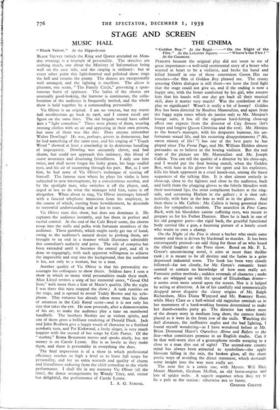THE CINEMA
" Golden Boy." At the Regal. " On the Night of the
Fire." At the Leicester Square. " Where's the Fire ? "
At the Gaumont.
PERHAPS because the original play did not 'seem to me of great importance—a well-told sentimental story of a boxer who wanted at heart to be a violinist, and broke his hand and killed himself in one of those convenient Green Hat car smashes—the film of Golden Boy pleased me. The crusty amusing Odets dialogue is still there—we have the fatal fight that the stage could not give us, and if the ending is now a happy one, with the boxer comforted by his girl, who assures him that his hands will one day get back all their musical skill, does it matter very much? Was the symbolism of the play so significant? Wasn't it really a bit of hooey? Golden Boy has been directed by Rouben Mamoulian, and apart from the foggy sepia tones which do justice only to Mr. Menjou's lounge suits, it has all the vigorous hard-hitting close-up effect one expects from the director of City Streets (let's forget and forgive Queen Christina and the rest). Mr. Menjou as the boxer's manager, with his desperate humour, his un- fortunate sexual life, and his recurring disappointments (" sweet misery of life! ") has one of the best parts he has played since The Front Page, and Mr. William Holden almost persuades us to believe in the boxing violinist. But the real stars of the picture are Mr. Mamoulian and Mr. Joseph Calleia. You can tell the quality of a director by his dose-ups, and I would put the final boxing match, when the Golden Boy, with hate in his gloves for the sport and his exploiters, kills his black opponent in a cruel knock-out, among the finest sequences of the talking film. It is shot almost entirely in close-up, close to the fighters and close to the audience, back and forth from the plugging gloves to the febrile blondies with their moistened lips, the stout complacent backers at the ring- side, and screaming Harlem in the gallery ; it is shot sub- jectively, with hate in the lens as well as in the gloves. And then there is Mr. Calleia : Mr. Calleia is being groomed these days for sympathetic stardom. The anarchist in Five Came Back, with his bloodshot canine suffering eyes, was meant to prepare us for his Father Damien. Here he is back in one of his old gangster parts—the rigid back, the graceful functional body carried like a gun, a haunting picture of a lonely crook who wants to own a champ. - On the Night of the Fire is about a barber who steals some money and then is driven by blackmail to murder. It has been extravagantly praised—an odd thing for those of us who heard the ribald laughter at the Press show. Based on Mr. F. L. Green's unconvincing novel, it aims at more than thriller rank ; it is meant to be all destiny and the furies in a grim depressed industrial town. The book has been very closely followed—far too closely, for Mr. Green's romantic brain seemed to contain no knowledge of how men really act. Fantastic police methods ; sudden reversals of character ; mobs who are whipped up with the speed of Flinbethan drama— it seems even more unreal upon the screen. Nor is it helped by acting or direction. A lot of his carefully and symmetrically dropped never disguise the classy origins of Mr. Ralph Richardson, Miss Diana Wynyard and Mr. Romney Brent, while Mary Clare as a half-witted old ragpicker reminds us in her mummery of a hard-working hostess determined to make her dumb-crambo party go. The director has taken most of the dreary story in medium long shots, the camera firmly placed as it were in the front row of the stalls. Watching the dull distances, the ineffective angles and the bad lighting, I found myself wondering—as I have wondered before at Mr. Brian Desmond Hurst's Ourselves Alone and Riders to the Sea—what constitutes promise in an English studio. Can it be that well-worn shot of a gramophone needle scraping to a close as a man dies out of sight? The second-rate cinema mind has always been attracted to symbolism—the apple blossom falling in the rain, the broken glass, all the sham poetic ways of avoiding the direct statement, which demands some insight into the way men really act.
The next fire is a comic one, with Messrs. Will Hay, Moore Marriott, Graham Moffatt, an old horse-engine and lots of spider webs. A superb sequence when they try to fix a pole in the station : otherwise not so funny.
GRAHAM GREENE.












































 Previous page
Previous page